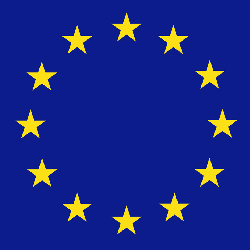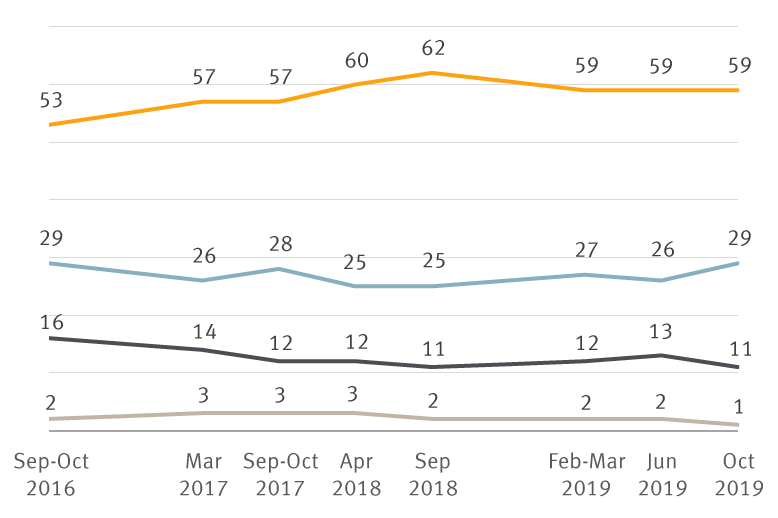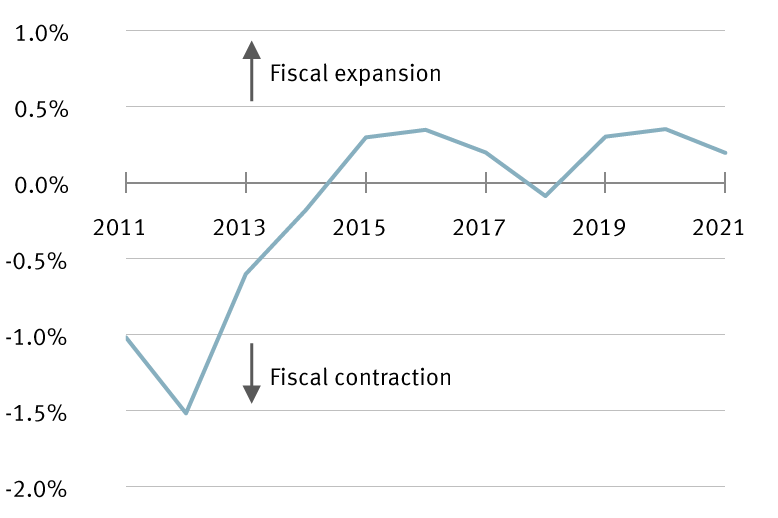Investment Strategies
Brexit's Impact On The EU - A View From RBC Wealth Management

The wealth management firm examines the UK's fractious relationship with the EU bloc and what the effect Brexit may have on the remaining members of the Union.
Written by Frédérique Carrier, head of investment strategy, RBC Wealth Management, this overview analyses how the UK's departure from the European Union will affect the bloc. The item was originally issued as a report by the bank and is republished by this news service with RBC's permission. As ever, the usual editorial disclaimers apply; readers who want to respond can email tom.burroughes@wealthbriefing.com and jackie.bennion@clearviewpublishing.com
Dawn is breaking for a new Europe, with changes that will test
its resolve. We look at what awaits the EU and what it holds for
investment strategy.
The departure of the influential UK from the EU is the first
setback for the bloc’s integration experiment. But paradoxically,
it seems to have rallied support for the EU within the remaining
27 countries.
The loss of the UK’s contribution to the EU economy and its
budget is unfortunate but should be manageable.
Calls for a larger role for fiscal policy continue. Fiscal
rectitude remains the order of the day but increasingly appears
to be an antiquated model. Change may be afoot.
The departure of the UK from the EU will be felt in the bloc, but
this episode has also increased the union’s resolve and we expect
it to adapt to the new state of affairs. After a weak 2019, the
EU appeared to be turning the corner as 2020 began, but the
manufacturing shutdowns in China brought on by the coronavirus
outbreak are likely to push any European recovery into the second
half of the year. Some anticipated fiscal stimulus should help
matters on the continent, and we continue to see selective
opportunities for investors.
The first setback
The EU began in 1951 as a coal and steel trading bloc comprising
Belgium, France, Italy, Luxembourg, the Netherlands, and West
Germany. Initially, the main purpose was for West Germany to
expiate its role in World War II. By partly giving up its
national sovereignty and integrating into a larger, demilitarised
trading group with strict procedures, West Germany hoped for
rehabilitation.
The other five founding members saw an opportunity for
reconciliation and sought security in numbers, while France also
viewed the group as a potential counterweight to UK and US
influence. Since its formation, the bloc has ushered in a period
of peace and prosperity unseen in the continent’s history.
The UK was the first member to depart the group, which had grown
to 28 nations. Despite being a late joiner in 1973, the UK became
an influential EU member, given the size of its economy (second
only to Germany) and penchant for free market practices. Along
with the Netherlands, Sweden, Denmark, Finland, and Ireland, it
formed a group known as the Nordic Alliance, which offset French
policies favouring state intervention. The Netherlands, which has
tended to keep a low profile despite being the EU’s fifth-largest
economy, is likely to fill the vacuum left by the UK, though the
Nordic Alliance may see its influence wane minus the UK.
However, the UK’s departure seems to have rallied support for the
EU within the remaining countries as the political chaos that has
engulfed the UK since the June 2016 Brexit referendum has not
gone unnoticed.
Support for the EU within member states has increased
since the Brexit vote

Source - RBC Wealth Management, Parlemeter 2019 (92.2), QB12
In fact, many anti-establishment populist parties across EU
countries have mellowed their EU scepticism, instead railing
against immigration to win votes. Populist parties in Italy,
Austria, and Hungary all suffered electoral setbacks in 2019 -
though admittedly their poor showings could reverse if
immigration concerns return to the limelight. As a sign, the
danger of a populist government in Italy seems to have passed,
the spread of Italian government bond yields over German Bund
yields has recently fallen from a peak of 324 basis points (bps)
back to the March 2018 level of just 135 bps.
Modest economic consequences
Now with 27 members, the EU will remain one of the top three
economies in the world, though its share of global nominal GDP
will fall from 16 per cent to 14 per cent, according to the
International Monetary Fund.
Should the EU lose complete access to the UK market due to the
breakdown of negotiations over a new trade agreement, we believe
the impact would be modest as EU exports to the UK represent only
three percent of EU GDP. Moreover, the damage would be partially
offset by some diversion of trade, investment, and skilled
migrants away from the UK to the EU.
Similarly, the fiscal consequences of losing the UK’s
contribution to the EU budget should not be exaggerated. First,
the EU budget is a mere 1 per cent of the total value of the EU
economy - versus the US federal budget at some 20 per cent of GDP
and UK government spending of close to 40 per cent of GDP - as
most of the fiscal spending in the EU is done by national
governments.
Second, the loss of the UK’s net contribution to the EU budget,
which amounted to some £9 billion ($11.5 billion) in 2018, will
be felt in Brussels, but only over time. The UK will honour its
legacy financial obligations of more than £30 billion ($43
billion) per the terms of the Brexit Withdrawal Agreement.
Yet negotiations for the EU’s next seven budget years (2021–2027)
are particularly tricky given Britain’s departure, as EU members
have to agree how to split the bill.
Challenges for the short term
For now, the EU faces other challenges. After a difficult 2019,
economic activity at the start of 2020 had pointed to a healthy
pickup in growth, but this improvement is now being threatened by
the coronavirus outbreak. Factory shutdowns in China are
affecting not only the EU’s export demand but also some of the
supply chains of European companies. Eric Lascelles, chief
economist for RBC Global Asset Management Inc, estimates that the
outbreak may reduce EU economic activity by some 0.2 per cent,
though the magnitude of the impact is likely to depend on the
duration and severity of the shutdowns. RBC Capital Markets
expects 2020 GDP growth of 1 per cent.
Calls on national governments for more fiscal stimulus are coming
from many quarters, including the European Central Bank president
Christine Lagarde, who is aware that there are limited monetary
policy manoeuvres available with interest rates already in
negative territory. Moreover, the region has considerable spare
fiscal capacity, and with borrowing costs low, fiscal stimulus
would not only be appropriate but also affordable. Indeed,
France, Italy, and the Netherlands have already dipped into
government coffers a little in 2019, the former to appease the
Yellow Vest protests against fuel tax hikes.
However, Germany is resisting these calls so far. Its
constitution bans structural deficits of more than 0.35 percent
of GDP. As a result, Germany has run a fiscal surplus since 2014,
which peaked at 1.9 percent of GDP in 2018. German officials say
they will do away with that constitutional rule if conditions
warrant it. But with the economy at full employment, Chancellor
Angela Merkel’s government feels that the current slowdown isn’t
sharp enough yet to justify a major one-off fiscal boost.
But it can devise strategies to work around, such as off-balance
sheet vehicles issued by public bodies which can tap financial
markets without appearing on the central government’s books.
Recent incentives to speed up the conversion to cleaner energy
were partially financed in this manner and could soften the
impact of the slowdown.
A bit more spending expected in 2020
Fiscal spending could be more generous but it would require
changing the fiscal framework.

Source - RBC Capital Markets; excludes interest payments
For now, RBC Capital Markets expects fiscal stimulus of 0.4 percent of GDP for the EU as a whole in 2020.
Lagarde is also trying to push the EU Commission, the executive
branch of the EU, for changes to fiscal policy. The commission
wants to loosen the current EU fiscal framework, which targets a
debt-to-GDP ratio of 60 per cent and a deficit of no more than 3
per cent of GDP. These simple rules seem dated and too
restrictive for a time of record-low borrowing rates and meagre
growth. The EU Commission intends to propose changes by the year
end.
Investment strategy
Now a bloc of 27 members, we believe the EU will evolve, guided
by its culture of consensus which was able to produce the desired
outcome in the divorce negotiations with the UK. With resilient
domestic demand underpinned by some fiscal support, we would
expect the eurozone’s economy to eke out enough growth to
generate mid-to-high single-digit corporate earnings growth.
With the STOXX Europe 600 ex UK Index’s undemanding
price-to-earnings valuation of 14.3x based on 2021 consensus
estimates and a dividend yield above 3 per cent, there is room in
portfolios for an allocation to well-managed European companies
with strong business models and leading market positions, in our
view. For example, we believe investors can find opportunities in
the consumer spaces or the Industrials sector from companies
positioned to benefit from structural trends, such as increased
infrastructure spending, urbanisation, and digitalisation.